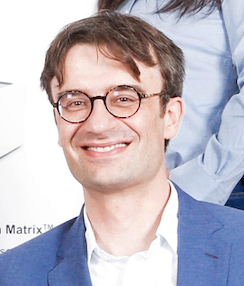Dr Andreas Schmidt, Senior VP Global Business Development, Singleron.
interviewed by Afram Yakoub
|

|
|
“To attract capital, let’s turn the game around”
|
For life science companies the choice of strategy is notoriously complex. Novel thinking and attracting capital –rather than chasing it – is required, says Singleron’s Dr Andreas Schmidt, who's speaking at NLSDays.
With a background spanning multiple roles as an entrepreneur, investor, and advisor, Dr Andreas Schmidt has a broad view on business strategies, a topic he looks forward to discussing in detail at the NLSDays supersession: Preparing for the next unicorn: how to choose your business model? senior vice president of global business development, Dr Schmidt has raised more than 50 million USD in venture capital and built the overall strategy of the companies he co-founded. He also established partnerships with multinational pharma companies and leading academic institutions in the US, Asia and Europe.
His foremost message to young companies in the tough fundraising environment is to have a clear path to early revenue independent of large scale venture capital.
“Early startup companies that can articulate precisely how they gather a new modality of clinically relevant data rooted in a unique and protectable wet lab method are the stars of our time. And startups with a path to early revenue being potentially independent from large-scale venture capital are kings”, he explains.
“In general, companies that not only have great technology but demonstrate that they can sell life-science related data and potentially build up new business models based on it will succeed. I am convinced that currently, it’s not just about the best technology, but about the demonstrated proof to be able to commercialize data in new ways. There will be a “Google moment” – or a few – in the life sciences”, Dr Schmidt predicts.
|
On bioconvergence and achieving balanced partnerships
The boundaries between biotech, medtech and AI are being blurred and bioconvergence is increasingly a reality in todays’ life science industry. Dr Schmidt believes this will influence traditional business models as precision medicine will rebalance the value creation proposition of diagnostics versus therapeutic drugs, citing one of the biggest icons of the tech world.
“Steve Jobs once said; ‘I think the biggest innovations of the 21st century will be at the intersection of biology and technology’. I believe that what we’re currently seeing in the car industry – as value is shifting from the guys building the engine to the ones programming the autonomous navigation systems – will happen in the pharma industry as well.”
It remains to be seen whether pharma companies will be fast enough in terms of “innovation by acquisition” so that this shift will happen within a company, or if this will be a value shift towards more digital and potentially completely new companies, Dr Schmidt muses.
The company he led, Proteona, was successful in partnering with pharma and was acquired by Singleron last year. But partnering and acquisitions between technology and pharma companies are not a walk in the park as Dr. Scmidt has experienced firsthand.
Partnering with pharma for a platform technology company is challenging as there are many possible entry points and conversation partners. Even the pharma companies themselves often cannot say where to start. Finding the best fit that translates into mutually beneficial business can be a lengthy road.
“A partnership between a startup and pharma alone often suffers from a lack of medical direction. While a startup and clinic working together miss the scalability, impact and resources of a big pharma company. And a clinic and a pharma working together typically is called a different name: it is a clinical trial, not an innovation partnership”, Dr Schmidt points out.
|
Hunting for capital by turning the game around
Nordic countries have many spin-off companies from academia and a tradition of early IPOs. At the same time, the level of international investors in the Nordic life science industry is relatively low. From Dr Schmidt’s perspective, it’s mostly useless to chase international venture capital the traditional way. The effort should instead be put into strategies to attract investors indirectly.
“Turn the game around. Attracting international investors is hard. Especially if you have Silicon Valley or Boston life science investors in mind. Why should they invest far away in an unknown company and team if they can invest within their ecosystem in front of their door and can basically grab a coffee at Starbucks while walking over to the board meeting of their portfolio company?”, he asks rhetorically and proposes several alternative strategies to attract foreign investment.
One such strategy he likes to see is to attract early foreign startups backed by big VCs and offer them clinical trials, research or business partnering conditions in the Nordics, as a way to also bring along the VCs connected to them.
“Another option I see working out quite well around me is to focus on the so called “turtle entrepreneurs”. These are scientists from top notch universities that go back and start anew in their home country drawing in investors from their academic circles from places such as Stanford, Harvard, MIT and other such institutions.”
Taking a cue from Singapore, Dr Schmidt suggests yet another indirect strategy that involves utilizing the economic weight of national institutions to lure investors.
“Use the networking value of your countries’ retirement system. Venture capital funds need to raise their money from limited partners, too. And these limited partners have some deep access to the VC funds’ incentives and operations. And who is the superstar in playing that game? Singapore! Their national endowment is spread across Sandhill Road, which is the VC lane around Stanford, and Kendall Square, the yard in front of MIT. This might be a hint for Norway in particular”, he says in reference to Norway's’ enormous national sovereign wealth fund.
|
Looking forward to real life examples at NLSDays
As speaker for the supersession Preparing for the next unicorn: how to choose your business model?, Dr Schmidt looks forward to all the encounters and the ability to dive deeper into the topic and fill it with real life examples. The ability to interact in person is also something he appreciates post-Covid.
“I look forward to interacting with the great life science community in person. While Corona helped to push digitalization it also made me appreciate the personal contact to meet for a coffee and brainstorm the next projects and proposals that lead to both pragmatic business as well as next generation breakthroughs”, says Dr Schmidt.
|
Register for
NLSDays 2023 here
|
 The largest Nordic partnering conference in life science The largest Nordic partnering conference in life science
Nordic Life Science Days is the largest Nordic partnering conference dedicated to the life science industry. Since its inception in 2013, the event has nurtured a community of people from the world of life science, and created a unique place to do business.
|
|